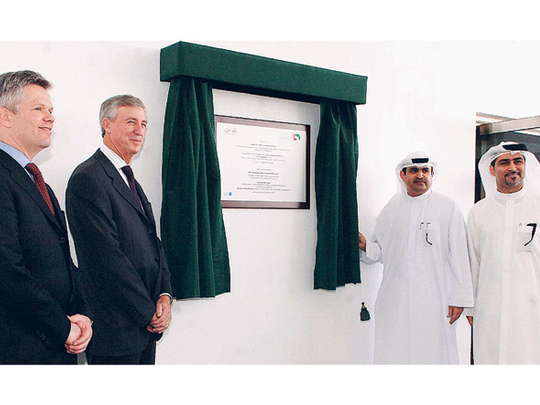
Dubai: The Department of Economic Development (DED) has led the initiative to transform a critical Dnata Cargo site — the FreightGate-5 airport cargo terminal — to develop the first carbon neutral warehouse in the Middle East.
This will serve as a template for green warehousing across Dubai that, according to the estimates made during the study, can save 1.9 million tonnes of carbon dioxide annually by 2020, equivalent to the current annual carbon footprint of some 60,000 UAE residents.
The path-breaking initiative is part of the agreement signed between the DED and DHL last year to develop logistics innovation initiatives that drive efficiencies within the logistics sector through better policy management.
The carbon reduction initiative is one of the key work streams that is part of the longer City Logistics agreement inked by the two organisations.
One of the key stages in the carbon reduction plan was to convert a government-owned and operated warehouse in Dubai to carbon neutral status and follow it up with research and development of blueprints for reducing carbon in warehousing and vehicles in the logistics sector.
Over and above that, an initiative was also launched to conduct a carbon footprint assessment of the emirate's logistics sector and drive general awareness amongst businesses in the emirate.
Built by Dnata Cargo less than three years ago, FreightGate-5 has a prominent and important role in the transit of freight and is easily accessible from the centre of the city.
The ease of access was a prime consideration in choosing the site, which covers about 13,000 square metres.
Following the highest standards of resource-use efficiency, the upgrading will now lead to significant energy savings, with the investment of just under Dh600,000 to be paid back in two to four years.
Case approval process
The cost of each specific energy saving measure proposed for the warehouse was ascertained and then subjected to a standard business case approval process, in order to measure their financial viability in the UAE.
The upgrade implementation effort led by DHL Energy Performance and Management has resulted in savings in electricity used in the warehouse of between 36-40 per cent, depending upon the implementation of ongoing energy reduction initiatives by the warehouse staff and the level of operational activity in the coming year.
This amounts to some 450 megawatt hours a year, equivalent to 167 tonnes of carbon dioxide — that is, 835 tonnes over the five year time-frame that the project took in its analysis of the warehouse.
Sami Al Qamzi, DED director-general, said: "As a hub for trade in the region, Dubai's logistics sector plays a vital role in the economy.
"Integrating the emirate's logistics sector with sustainable development best practices is imperative to drive further efficiencies, and will generate stronger demand for the logistics sector."












